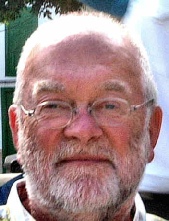

COMPUTING AND COMPUTERS Part 1
I've been fascinated by computers for as long as I can remember. I've seen them come and I've seen them go and followed developments over many decades, mostly by being involved and using them. So I thought I'd collect my scattered thoughts together. It’s not meant to be complete, just an account of my personal experiences.
I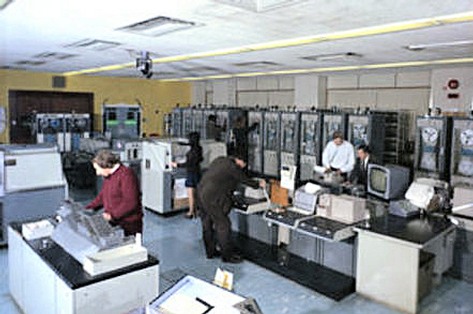 n the early 1960s there was an Atlas Computer in the University Computing Department. It filled rooms which were air-
n the early 1960s there was an Atlas Computer in the University Computing Department. It filled rooms which were air-
No-
For a computer to be useful, you have to tell it what to do and how to do it (the program) and what you want it to do it with (the data). In the early days both of these (the input) were delivered on punched cards (invented by Herman Hollerith and a development of the much earlier Jacquard loom pattern instruction cards (2) ).
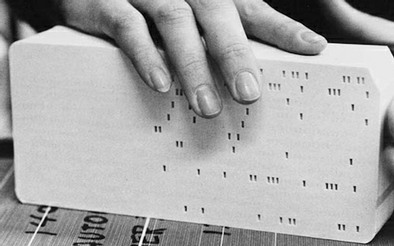 You did the physics and materials science, and the maths. Then you devised the equations, wrote the program, collected together the input data then used a machine to type it all out and produce sets of cards -
You did the physics and materials science, and the maths. Then you devised the equations, wrote the program, collected together the input data then used a machine to type it all out and produce sets of cards -
Before we had a computer on the premises where I worked, this deck of cards was transported by courier to London overnight, fed into the Company computer (there was only the one) which ran the program and produced the output, and the whole lot was delivered back ready to examine the following morning.
Much later we had a mainframe computer on the premises. But I'm getting ahead of myself. Lots happened before that.
One day in the early 1970s I passed a room at the end of the corridor. It contained a Digital Equipment Corporation (DEC) PDP8 minicomputer in an instrument rack. Input was by punched paper tape (3) and output was printed on a teleprinter of the sort that used to present football results on TV.

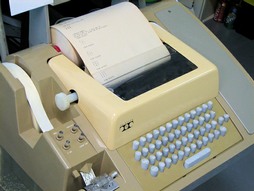
That room was hallowed territory too and only a few people were able to use it. I thought I must find out about that. Don't know why exactly, but there was a sense that this was the future and I wanted to be part of it. So I set about teaching myself computer programming.
There was no magnetic storage readily available at that time. When you first switched the computer on, you had to key in, one by one, the binary characters which formed the miniprogram to teach it how to read paper tape. Then you could load the 'bootstrap' program tape (the computer ‘lifted itself up by its own bootstraps’) which showed it how to load the Operating System which then taught it how to interact with the rest of the hardware and software including the input and output devices. These days we call the electronic version of this 'booting up' and that’s why.
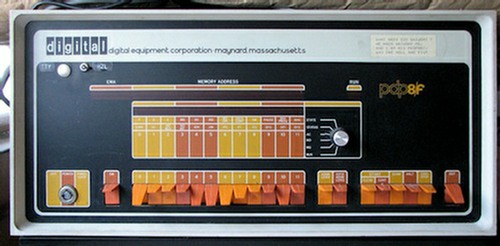 The PDP8 programming language was BASIC, developed at Dartmouth College, US, in the mid 1960s (4) . This is the programming language adopted later by most micro and mini personal computers and is deliberately straightforward to use. It was heavily based on a language called Fortran (Formula Translation) developed for mathematical and scientific use. I learnt Fortran first and so BASIC was then an easy next step.
The PDP8 programming language was BASIC, developed at Dartmouth College, US, in the mid 1960s (4) . This is the programming language adopted later by most micro and mini personal computers and is deliberately straightforward to use. It was heavily based on a language called Fortran (Formula Translation) developed for mathematical and scientific use. I learnt Fortran first and so BASIC was then an easy next step.
Having developed an equation to allow the calculation of the distribution of strain, and the consequent effects on integrity, in various parts of reactor joints under operating conditions, I realised that you couldn't solve it analytically/algebraically. So there was nothing else for it but to write a computer program to do it by brute force -
At about this time, computers were becoming more powerful, cheaper and personal. Various mini and micro-
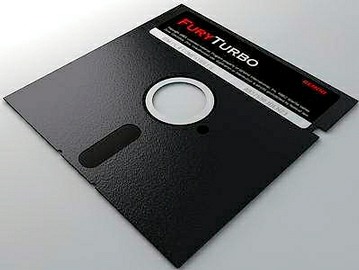 Early storage systems used 5.25inch magnetic floppy discs while some personal computers used compact cassette tapes. The latter were less convenient, and successful, as data were not accessible randomly and you had to wind backwards and forwards to find anything. Later the randomly accessible 3.5inch floppy disc, encased in and protected by a compact plastic sleeve, was invented and data and programs could easily fit into your pocket (6).
Early storage systems used 5.25inch magnetic floppy discs while some personal computers used compact cassette tapes. The latter were less convenient, and successful, as data were not accessible randomly and you had to wind backwards and forwards to find anything. Later the randomly accessible 3.5inch floppy disc, encased in and protected by a compact plastic sleeve, was invented and data and programs could easily fit into your pocket (6).
Personal computers became popular and the IBM PC was born, along with the phrase "Nobody ever got sacked for buying IBM".
I once presented a scientific paper at a Conference in Petten, The Netherlands, but had to suffer the embarrassment and indignity of being able to offer only a handwritten version at the time of the Conference.
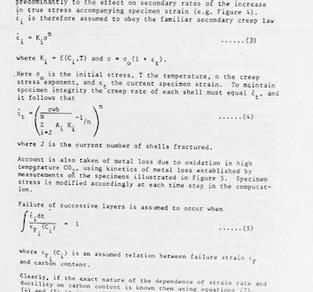 It couldn't be typed because the waiting list for typing was over a fortnight long and, strangely and shortsightedly, there didn't seem to be any means of prioritising. After the advent and availability of the Personal Computer with its word processing capability, I never wrote anything by hand again. And the Typing Pool were surprised when their work load dried up . . .
It couldn't be typed because the waiting list for typing was over a fortnight long and, strangely and shortsightedly, there didn't seem to be any means of prioritising. After the advent and availability of the Personal Computer with its word processing capability, I never wrote anything by hand again. And the Typing Pool were surprised when their work load dried up . . .

10 december 2020


All original writing

2014, 2015, 2016,
2017, 2018, 2019,
2020, 2021, 2022,
2023, 2024
Dr Ian McLauchlin
